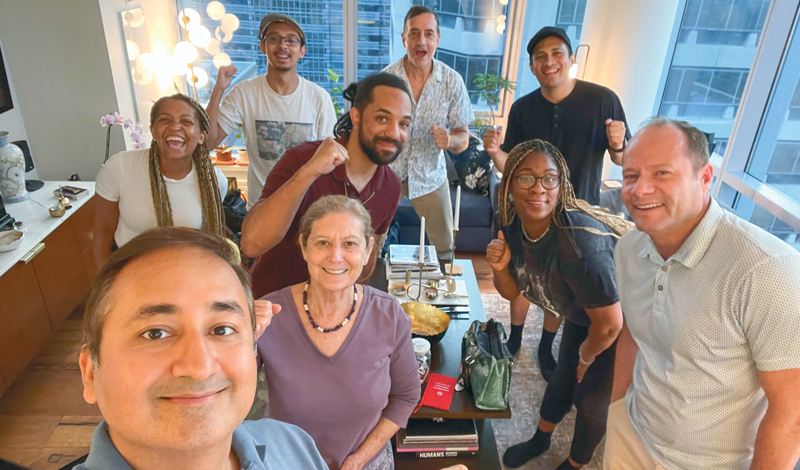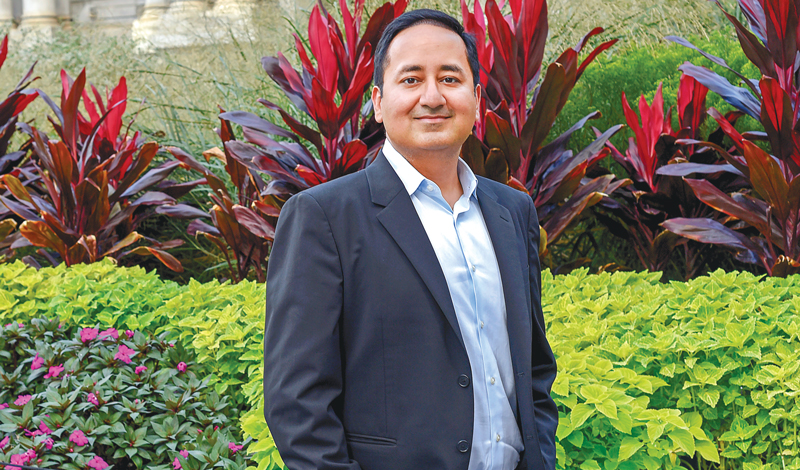by Bhuvan Wadhwa
Philadelphia
Say you came by early one morning—maybe on business, maybe not. It wouldn’t have mattered to my mom. She’d be up before you got there, stacking dosas and fruits in the kitchen. Ours is a large family, always coming and going. But food in my mother’s home was never made for us alone. Breakfast was made for the gardener, the friend, the guest.
Visiting in December 2023, I woke to an unfamiliar quiet. My mother was not in the kitchen. Diagnosed with lung cancer in 2019, her health had been ebbing since; each visit I made to New Delhi, I found her a little more frail, the fruit, a little more bitter. Each time, I felt a shock of indignation. Of all people, why her?
Early that year, I was given the opportunity to take on leadership for a district with few, if any, members coming out to meetings. This had been so since the end of the pandemic.
“Many and body, one in mind,” my co-leader, Lorrie, reminded me. “If we’re united in prayer, then that prayer will bear fruit.”
For me, there was a connection between the life of the district and the life of my family. Reviving the district was, for me, a cause to protect them.
In our district, we set a goal to welcome five new youth by the end of the year. And we set a rhythm of weekly meetings and stuck to it. There were days early on, when it was just me and Lorrie chanting. I began poring through the membership list and calling people up. I got ahold of one person here, another there, who began coming out. Within a matter of months, we’d gone from two to seven, eight, nine. We became a district others looked to for inspiration.
In April, we welcomed a young woman to the practice—an exciting event in a district no one had joined in years. I remember the moment, catching Lorrie’s eye, which had in it both joy and a challenge: We can do this.
I was struggling, though, badly. A new cancer medication was affecting my mother in unpredictable ways.
Getting off our regular call (my morning, her evening), I had, for some reason, the instinct to call back. An hour later, I did—she’d just returned home from a walk with my father. I spoke with him, who then handed the phone to her before retiring to the bathroom to wash. My sister, who lives down the street from them, happened to call me, and I merged the two. My mother was talking when her face froze, her words catching. “She’s having a stroke!” I realized aloud, and urged my sister to her side. I caught the next flight to New Delhi.
This was in August of last year. I stayed in Delhi until my mother stabilized, then came home. In November, though, just days after Ikeda Sensei’s passing, her health took a nosedive. Boarding the plane, a selfish kind of anger kept the shock at bay. How could you leave, Sensei, at a time like this?
Not until the day before her death did I accept the evidence. Numb at her bedside, something occurred to me suddenly, and I knelt to her ear. “Ma, wherever you’re going, I think you’ll meet my mentor there. Probably he’ll ask you to breakfast. Say yes, OK? You’ll like him.”
I came back to a different Philly. It felt like every pillar holding up the sky had been kicked out. “Just stay busy,” friends advised. “Throw yourself into your work and you’ll be fine.” But this was not work. I wasn’t fine. I’d lost my best friend.
I didn’t vanish into my grief, though, didn’t let it crush me. I’d made a pledge with Lorrie, to Sensei in front of the Gohonzon, that we would see our district revived. I kept up with our rhythm: chanting, discussion, chanting, study. But otherwise, the first few months after my mother’s passing, Lorrie took the wheel. Coming home from each meeting, I broke down as soon as the door shut behind me.
The world did not stop moving. Come March, a series of sudden changes made me move with it. Chapters were hosting youth gatherings across the country and the world, and ours was no exception. The morning of, the member who’d planned to host our meeting fell sick with COVID. Scrambling to secure a new location, I got ahold of my building’s management and, last minute, reserved us a community space on the grounds. I rushed to pick up food and, plating it just before the youth showed up, found myself speaking softly to myself. “Make sure they’re properly fed.” My mother’s words. A familiar sensation came over my face, where underused muscles fired weakly. I was smiling.

I left them to their fun, but before I did, watched them chatting happily. Rounding back for the cleanup, several came up to say how much they loved the meeting, how we ought to do more like this!
A few days later, a senior leader visited me at home. “It’s OK to grieve,” he told me. He relayed to me the great losses experienced by Josei Toda—the loss of his daughter, then his wife. And how, having experienced such loss, such grief, he had been able to come to terms, at last, with the meaning of death. Life, Mr. Toda came to understand, was eternal. We will certainly meet again with those we’ve loved in this lifetime.
That home visit changed something deep within me. I began chanting with the conviction that my mother’s life and my own were deeply connected. How would she feel, I wondered, if she saw me now—saw our whole family swallowed by grief? How could she possibly be happy? It was up to me, I realized, to stand up in her spirit, to become a force of harmony and hope within the family. And I realized that I had to do this in my district as well, in my mentor’s stead.
Slowly, I began to turn a corner. I began to fully support the young men’s and men’s division members who’d begun their practice, going to them regularly, to their homes, taking nothing for granted, putting nothing off for tomorrow.
Our youth are rising up, getting benefit and supporting each other. At a recent leaders’ meeting here in Philly, all four of our district’s new youth—who began their practice this year—were supporting behind the scenes.
Where my mother is concerned, I no longer worry whether we’ll meet again someday. I feel that we already have. We have a standing date, she and I, in front of the Gohonzon, early in the morning, where my mentor joins us, too.
You are reading {{ meterCount }} of {{ meterMax }} free premium articles

